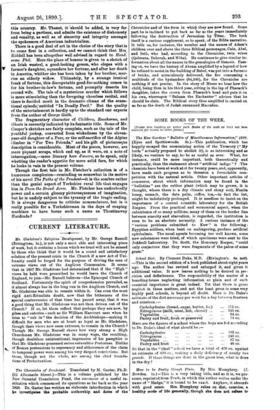SOME BOOKS OF THE WEEK.
[Under this heading we notice such Books of the week as have not been reserved for review in other forms.]
The Kew Gardens "Bulletin of Miscellaneous Information," 1898. (Eyre and Spottiswoode. 3s.)—This publication, which has happily escaped the economising action of the Treasury (" My lords " actually proposed to abolish it), is as interesting and as likely, we venture to say, to be as useful as ever. What, for instance, could be more important, both theoretically and practically, than the statement about " artificial indigo " ? -The chemists have been at work at it for twenty years, and, apparently, have made such progress as to threaten a formidable com- petition with the natural article. Other important articles of commerce, about which information may be found in the "bulletins" are the rubber plant (which may be grown, it is thought, where there is a dry climate and stony soil), Manila hemp, sumach, the date palm, coffee, tea,—in fact the list, might be indefinitely prolonged. It is needless to insist on the importance of a central scientific laboratory for the British Empire. From the practical and economical aspect, when the subsistence of so many millions, many of them on the border line between scarcity and starvation, is regarded, the institution is seen to be an absolute necessity. A curious instance of the " various problems submitted to Kew " is the following : Egyptian soldiers, when bent on malingering, produce artificial ophthalmia. The usual agents becoming too well known, some new substances were tried, of which specimens were sent to the Joddrell Laboratory. Dr. Scott, the Honorary Keeper, "could only conjecture that they were fragments of the paten of some grass."


































 Previous page
Previous page